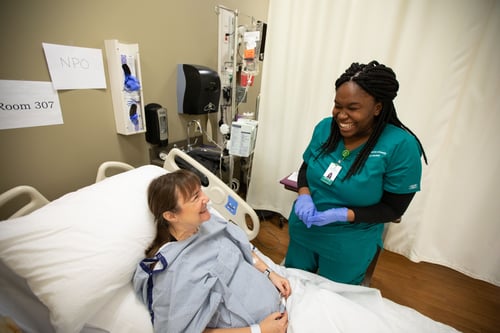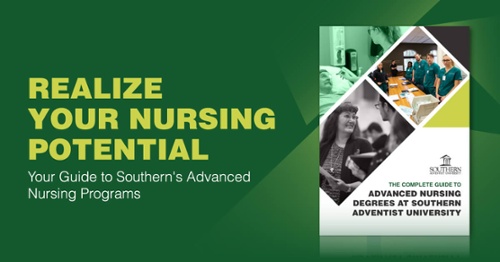How to Become a Nurse Practitioner in the Tennessee Valley
There is always a strong need for passionate, knowledgeable nursing professionals who care deeply about providing the highest level of care to their patients.
Nursing leaders with advanced nursing degrees are high in demand and Tennessee is no different. According to Nurse Journal, it’s also a wonderful place to take the next step in your nursing education: “Nursing students in Tennessee can expect expanding career opportunities, competitive salaries, and a relatively low cost of living.”
If you live in the Tennessee Valley (which includes Tennessee and parts of Kentucky, Georgia, Alabama, North Carolina, and Virginia) and you’re thinking about becoming a nurse practitioner, then you’re probably wondering which advanced degree you should pursue.
Generally speaking, there are two paths to becoming a nurse practitioner: earning a Master of Science in Nursing (MSN) or a Doctor of Nursing Practice (DNP) degree. Here’s a breakdown of how each program prepares you for a successful career as a nurse practitioner.

How Your MSN Nursing Education Leads to a Nurse Practitioner Career
If you’ve already earned your registered nurse (RN) license, have gained experience as a nurse, and want to take that next step in your career, then earning your MSN will put you on the path to becoming a nurse practitioner. Employment levels for MSN nurses are projected to grow 30 percent over the next 10 years, which is much faster than other occupations. Being a nurse practitioner was also recently voted as the best job in healthcare.
MSN nursing programs enable you to pursue advanced training in the specialized area that interests you, such as acute care, adult/gerontology, family care, and mental health. Nurses with an MSN are prepared to work in a variety of healthcare settings, including hospitals, schools, private practices, rehabilitation centers, and public health agencies.
For example, a family nurse practitioner (FNP) practices a family-focused approach to nursing. They work with people of all ages to help with treating injuries, illnesses, and preventative care.
A nurse practitioner with training in lifestyle medicine focuses primarily on a holistic approach to patient care. They work with patients on the management of chronic illnesses, prevention of disease, and promoting healthy lifestyles.
Another path you could take as a nurse practitioner is to choose an adult/gerontology emphasis, which prepares nurse practitioners to work with adults and the elderly in non-acute settings, such as medical offices and long-term care facilities. Specializing in acute care would prepare you to work in settings like emergency rooms (ERs) and intensive care units (ICUs).
Across all specializations, the average salary for a Tennessee nurse practitioner is about $99,370, with the potential for increased pay with more experience and assumed responsibilities.
For more insights on MSN vs. DNP degrees, check out our blog post:
MSN vs. DNP: Exploring the Paths to Becoming an Acute Care Nurse Practitioner.
Why DNP Experience Sets You Up for Success as a Nurse Practitioner
The other route to becoming a nurse practitioner is by earning a DNP degree.
Typically, you’ll need to have already earned your MSN to be accepted into a DNP program, though there are accelerated programs designed for people who’ve earned their Bachelor of Science in Nursing (BSN) degree and want to move directly into a DNP track.
Earning a DNP will expand your advanced nursing skills in your specialization of interest and help you provide the highest level of patient care. It will also open you up to many different career paths that you could explore beyond being a nurse practitioner, in addition to those listed above with the MSN.
For example, one of the most common trajectories taken by nursing professionals with a DNP is to become a nurse educator, teaching in a college or university nursing program. If you want to become a nurse practitioner now but one day might want to help teach the next generation of nurses, then this may be the path for you.
As you gain clinical experience and explore options to advance your career, you may also decide to go into nursing administration or other specializations. A DNP and a strong nurse practitioner background will help prepare you for many different paths as a nursing leader.
Nurse practitioners with a DNP also enjoy a strong earning potential because of the advanced skills they have and how desirable they are to healthcare employers. In Tennessee, the average DNP nurse practitioner’s salary is $102,710.
|
“As an advanced practice nurse, you are a leader. It’s not about bossing people around; it’s about educating the staff so they can do what’s right for the patient.” Diana Taylor, BSN to DNP, Class of 2021 |
“As an advanced practice nurse, you are a leader. It’s not about bossing people around; it’s about educating the staff so they can do what’s right for the patient.”
Diana Taylor, BSN to DNP, Class of 2021
Nurse Practitioner Careers in the Greater Chattanooga Area
If you’re considering a nurse practitioner career in the Greater Chattanooga or Tennessee Valley area, here are the average salaries for nurse practitioners in the surrounding states:
- Tennessee: $99,370
- Georgia: $106,220
- Alabama: $99,790
- Kentucky: $102,460
- North Carolina: $108,370
- Virginia: $109,660
You can take your career in the direction that you’re most passionate about and specialize in areas like family care, emergency care, gerontology, neonatology, pediatrics, or acute care.
Here at Southern, we offer both MSN and DNP programs for nursing professionals, like you, who want to take their careers to the next level. Visit our nursing program page to learn more about how our graduate nursing programs could help you advance your career.
You should also grab this free resource: The Complete Guide to Advanced Nursing Degrees at Southern Adventist University.
In this guide, you’ll get insights into and guidance on earning an advanced nursing degree, including:
- The MSN and DNP tracks and which one is right for you
- Career tracks including nurse practitioner, nurse educator, and nurse administrator
- Salary outlook and job opportunities in different fields
- Why a faith-based approach will prepare you to thrive as a nursing professional in the Greater Tennessee area



